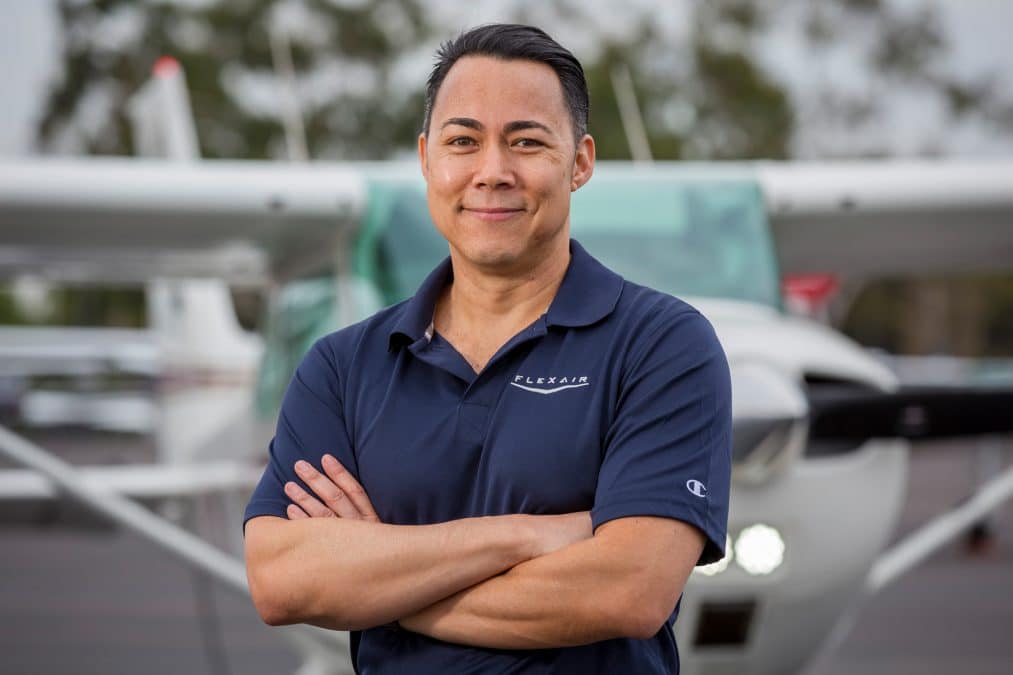Almost 86 percent of pilots and flight engineers are white, while less than 1 percent are Native American, according to the 2018 American Community Survey from the U.S. Census Bureau.
Citizen Potawatomi Nation tribal member and former Navy pilot Paul Wynns believes his growing business, Flex Air, “can change the face of aviation.” The flight school founded by his partner Charlie Copeland has two locations — Manhattan, Kansas, and San Diego, California, where Wynns is located.
Wynns’ mother was Vietnamese and his father was a descendant of the Upton family. In a recent Hownikan interview, he said he rarely saw people like him in the aviation industry. Wynns’ mother immigrated to the U.S. after meeting his father during the Vietnam War in the 1970s. After a successful military career as an active duty Navy pilot for more than a decade followed by corporate positions, he sees Flex Air his chance to give back.

Mentorship
Wynns’ mother always told him his first word was “airplane,” and seeing the movie Top Gun in high school sealed his fate to become a pilot. After graduating, Wynns immediately earned his bachelor’s in aerospace engineering at the Naval Academy, followed by flight training. His experience there varied greatly from a commercial flight school, which often offers no career advice or counseling.
Flex Air’s mission is “to provide aviation education and airline career opportunities to minorities, veterans, and students from low-income backgrounds.” He and Copeland share the same entrepreneurial desires to make it happen.
“He had a vision of wanting to do stuff differently. … He really wants to partner with people, provide good mentorship to them, not just the training. It was a philosophy that really resonated with me from the stuff I learned in the military about leadership,” Wynns said.
Many students lack the knowledge to choose between numerous paths in aviation. Flex Air begins a student’s program by asking about their desires for work-life balance, time spent traveling and where they want to live to help determine their end goals, whether flying for an international airline, cargo planes, jets for smaller companies or something else.
“That’s kind of a niche that we try to fill with that individualized approach,” Wynns said.
Investment
To improve Flex Air’s methods, Wynns enrolled in a doctoral program in fall 2020 at the Rady School of Management at the University of California San Diego with assistance from the CPN Department of Education scholarship. He plans to study “social impact investing” as a way to analyze success by more than financial reward.
“How many people can you help? Are you helping to lessen other problems that everyone in society pays by reducing unemployment, increasing outcomes for people because you are reducing the impact of climate change? There’s a whole area that is kind of small right now because it mixes a little bit of philanthropy with a little bit of investment,” Wynns said.
Flight school costs upward of $70k. Federal education loans do not cover the costs of flight school, and a lack of options forces students to fund their education through loans.
“I looked at it as an outsider, coming from military flight training, and my initial reaction, as I looked across the industry, was ‘What in the world? Why are people putting up with this?’ … I see (social impact investing) as solving a problem that people really need help with, especially if they don’t have access to financing, which disproportionately affects people of color,” Wynns said.
He hopes to use his knowledge to open up Flex Air to those in need of financial assistance by creating new funding options.
“You need to get capital providers. You need to create loan programs. You need to create the types of alternatives to loans. And that’s all part of social impact investing, and I think it’s going to take a lot of research in order to create a lot of those programs from scratch,” Wynns said.
He hopes Flex Air’s students see a vast set of career opportunities in aviation and the company’s ability to help them turn their love for flying into a reality.
“As an 18-year-old kid, I came for all the cool planes and everything, and I still think they’re cool,” Wynns said. “But why I stay in the industry is for the people. …They have a passion. They believe in what they do. They’re self-starters. They believe in their own skills. They work hard to attain those skills. It’s just neat to be around that kind of a community.”
Visit Flex Air online at goflexair.com and on Facebook @goflexair. Find out more about CPN’s scholarship program at cpn.news/education.
